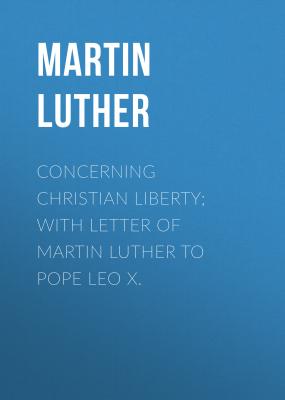Concerning Christian Liberty; with Letter of Martin Luther to Pope Leo X.. Martin Luther
Читать онлайн.| Название | Concerning Christian Liberty; with Letter of Martin Luther to Pope Leo X. |
|---|---|
| Автор произведения | Martin Luther |
| Жанр | Философия |
| Серия | |
| Издательство | Философия |
| Год выпуска | 0 |
| isbn |
In fine, that I may not approach you empty-handed, blessed Father, I bring with me this little treatise, published under your name, as a good omen of the establishment of peace and of good hope. By this you may perceive in what pursuits I should prefer and be able to occupy myself to more profit, if I were allowed, or had been hitherto allowed, by your impious flatterers. It is a small matter, if you look to its exterior, but, unless I mistake, it is a summary of the Christian life put together in small compass, if you apprehend its meaning. I, in my poverty, have no other present to make you, nor do you need anything else than to be enriched by a spiritual gift. I commend myself to your Paternity and Blessedness, whom may the Lord Jesus preserve for ever. Amen.
Wittenberg, 6th September, 1520.
CONCERNING CHRISTIAN LIBERTY
Christian faith has appeared to many an easy thing; nay, not a few even reckon it among the social virtues, as it were; and this they do because they have not made proof of it experimentally, and have never tasted of what efficacy it is. For it is not possible for any man to write well about it, or to understand well what is rightly written, who has not at some time tasted of its spirit, under the pressure of tribulation; while he who has tasted of it, even to a very small extent, can never write, speak, think, or hear about it sufficiently. For it is a living fountain, springing up into eternal life, as Christ calls it in John iv.
Now, though I cannot boast of my abundance, and though I know how poorly I am furnished, yet I hope that, after having been vexed by various temptations, I have attained some little drop of faith, and that I can speak of this matter, if not with more elegance, certainly with more solidity, than those literal and too subtle disputants who have hitherto discoursed upon it without understanding their own words. That I may open then an easier way for the ignorant—for these alone I am trying to serve—I first lay down these two propositions, concerning spiritual liberty and servitude:—
A Christian man is the most free lord of all, and subject to none; a Christian man is the most dutiful servant of all, and subject to every one.
Although these statements appear contradictory, yet, when they are found to agree together, they will make excellently for my purpose. They are both the statements of Paul himself, who says, "Though I be free from all men, yet have I made myself servant unto all" (1 Cor. ix. 19), and "Owe no man anything, but to love one another" (Rom. xiii. 8). Now love is by its own nature dutiful and obedient to the beloved object. Thus even Christ, though Lord of all things, was yet made of a woman; made under the law; at once free and a servant; at once in the form of God and in the form of a servant.
Let us examine the subject on a deeper and less simple principle. Man is composed of a twofold nature, a spiritual and a bodily. As regards the spiritual nature, which they name the soul, he is called the spiritual, inward, new man; as regards the bodily nature, which they name the flesh, he is called the fleshly, outward, old man. The Apostle speaks of this: "Though our outward man perish, yet the inward man is renewed day by day" (2 Cor. iv. 16). The result of this diversity is that in the Scriptures opposing statements are made concerning the same man, the fact being that in the same man these two men are opposed to one another; the flesh lusting against the spirit, and the spirit against the flesh (Gal. v. 17).
We first approach the subject of the inward man, that we may see by what means a man becomes justified, free, and a true Christian; that is, a spiritual, new, and inward man. It is certain that absolutely none among outward things, under whatever name they may be reckoned, has any influence in producing Christian righteousness or liberty, nor, on the other hand, unrighteousness or slavery. This can be shown by an easy argument.
What can it profit the soul that the body should be in good condition, free, and full of life; that it should eat, drink, and act according to its pleasure; when even the most impious slaves of every kind of vice are prosperous in these matters? Again, what harm can ill-health, bondage, hunger, thirst, or any other outward evil, do to the soul, when even the most pious of men and the freest in the purity of their conscience, are harassed by these things? Neither of these states of things has to do with the liberty or the slavery of the soul.
Конец ознакомительного фрагмента.
Текст предоставлен ООО «ЛитРес».
Прочитайте эту книгу целиком, купив полную легальную версию на ЛитРес.
Безопасно оплатить книгу можно банковской картой Visa, MasterCard, Maestro, со счета мобильного телефона, с платежного терминала, в салоне МТС или Связной, через PayPal, WebMoney, Яндекс.Деньги, QIWI Кошелек, бонусными картами или другим удобным Вам способом.
